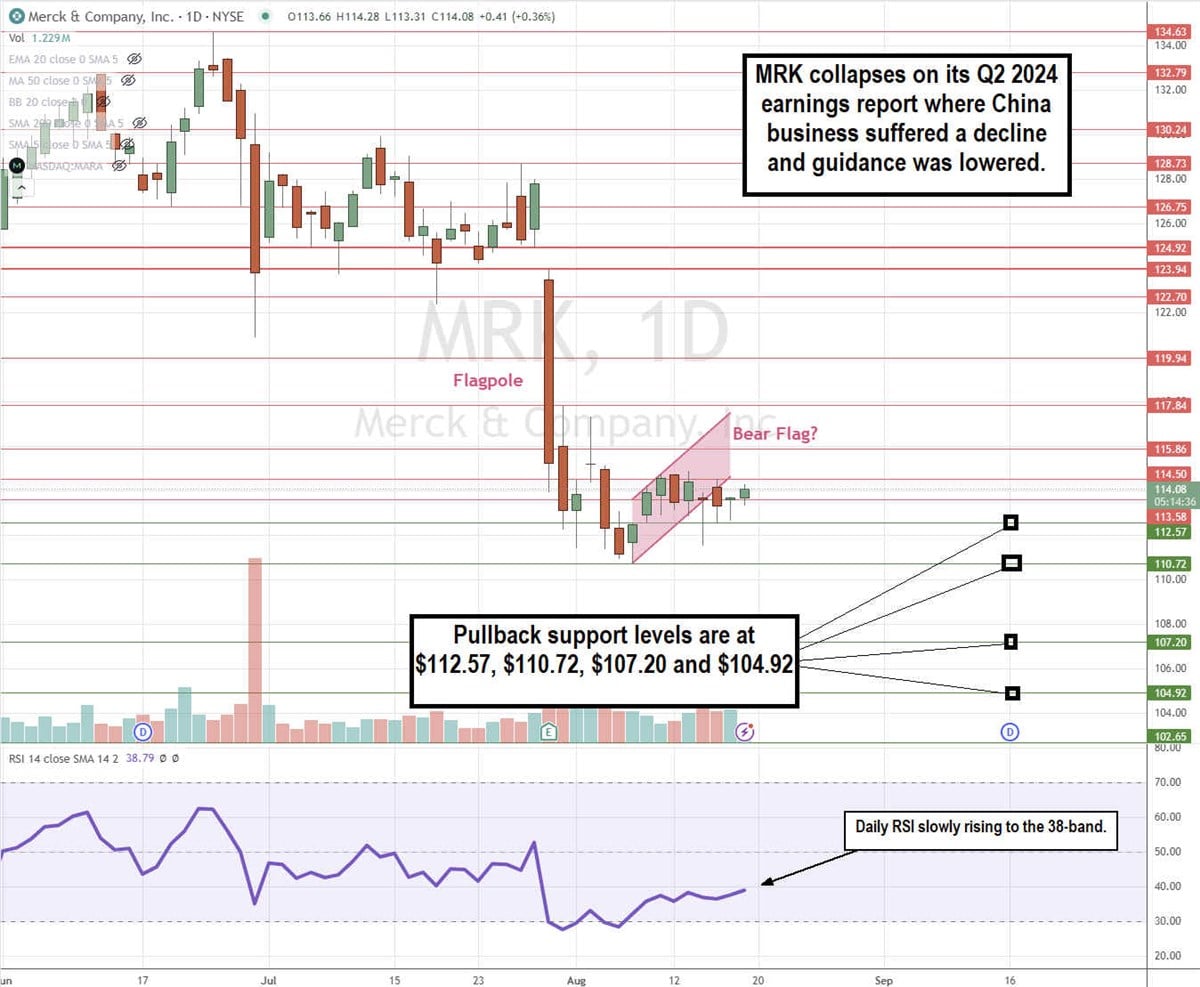
Global big pharmaceutical company Merck & Co. Inc. (NYSE: MRK) shares sank 9% following its Q2 2024 earnings release. Merck beat top and bottom line estimates, but the lowered full-year EPS 2024 guidance sank the stock. Its cancer drugs had a stellar performance, but weakness in its Chinese business caused it to cut guidance. Investors can consider the pullback a buying opportunity as its powerful franchises will continue flourishing.
The lowered guidance was attributed to a $1.3 billion one-time charge for its acquisition of EyeBio. Backing out the charge actually results in a solid beat against consensus estimates but still a slightly lowered full-year EPS guidance.
Merck operates in the medical sector and competes with big pharma companies like Pfizer Inc. (NYSE: PFE), Bristol-Myers Squibb Co. (NYSE: BMY), and Eli Lilly and Co. (NYSE: LLY).
Keytruda Dominates as Merck’s Top Drug
Merck’s top-selling drug in the second quarter was Keytruda, a leading immunotherapy drug used for various cancers, including lung, head and neck cancer and melanoma. Keytruda sales grew 16% YoY to $7.3 billion in the second quarter of 2024. Keytruda revenues make up 45.1% of Merck’s total revenues. However, it will go off patent in 2028, which enables biosimilars and generic versions to become available.
Gardasil Suffers a Surprise Decline in China
Gardasil/Gardasil 9 are vaccines that protect against human papillomavirus (HPV), which can lead to various cancers, including cervical. Sales rose 1% YoY to $2.49 billion in Q2 2024. The surprise came from China, which experienced an unexpected decline in sales. These vaccines made up 15.4% of Merck's total revenues in the second quarter.
Sales in the United States rose 10.2% quarter-over-quarter (QoQ), but China suffered a surprise decline in shipments. Nonetheless, Merck addressed this by noting that China remains a very strong addressable market, with over 120 million females who still haven't received protection for HPV. They will continue to push education with its distribution partner Zhifel. Merck still expects sales to exceed $11 billion by 2030.
Merck’s Capvaxive Gains FDA Approval: A New Competitor to Prevnar
Merck received FDA approval for its pneumonia and invasive pneumococcal drug Capvaxive on June 17, 2024. It will compete against the incumbent leader, Prevnar, which is owned by Pfizer.
Merck’s Anti-Diabetes Drug Targeted for Price Negotiation
The Biden administration is targeting $6 billion in cost savings in 2026 for 10 Medicare Part D drugs that will be negotiated under the Inflation Reduction Act. This is forecast to save Medicare patients $1.5 billion in out-of-pocket medication costs in 2026. Merck's anti-diabetic medication, Januvia, will be up for price negotiations. Januvia saw sales drop 27% YoY to $629 million in Q2 2024. The next round of 10 to 15 drugs up for negotiations will be presented in May 2025.

MRK Stock Setting Up a Bear Flag
The daily candlestick chart for MRK indicates a potential bear flag breakdown pattern. The earnings selloff on MRK formed the flag pole as shares fell to $110.72. The bounce off that level formed a flag with parallel ascending upper and lower trendlines, indicating higher highs and higher lows. However, MRK fell below the lower trendline at $113.58, setting up a potential bear flag breakdown if shares can't bounce back above the $114.50 trendline. The daily relative strength index (RSI) slowly rose to the 38-band. Pullback support levels are at $112.57, $110.72, $107.20, and $104.92.
Merck reported Q2 2024 EPS of $2.28, beating consensus estimates by 12 cents. Revenues grew 7.1% to $16.1 billion, beating consensus analyst estimates of $15.87 billion.
Full-Year Guidance EPS Impacted by One-Time Charge
The lowered full-year guidance turned investors off, but there was a key explanation. Merck lowered 2024 EPS guidance down to $7.94 to $8.03, from its previous guidance of $8.53 to $8.65. The new guidance reflects the negative impact of a one-time charge of $1.3 billion or 51 cents per share for the acquisition of EyeBio. The consensus estimate is $8.16. Full-year revenues were actually raised to $63.4 billion to $64.4 billion, up from the previous forecast of $63.1 billion to $64.3 billion versus $64.29 billion consensus estimates.
Backing out the 51 cents one-time charge still results in a lowered EPS guidance of $8.45 to $8.54, which handily beats $8.16 consensus estimates.
Merck CEO Robert Davis commented, "Through excellent scientific, commercial and operational execution, we're achieving significant milestones for our company and patients, including the launch of WINREVAIR. I am proud of our dedicated teams around the world that are working tirelessly to advance our deep pipeline as we continue delivering innovation that solves unmet medical needs."
Merck & Co. analyst ratings and price targets are at MarketBeat. There are 15 analyst ratings on MRK stock, comprised of three Strong Buys, nine Buys, two Holds, and one Sell. Consensus analyst price targets point to an 18.24% upside at $134.58.













